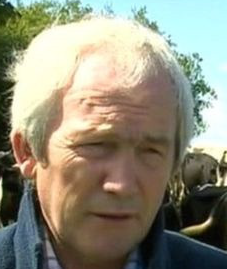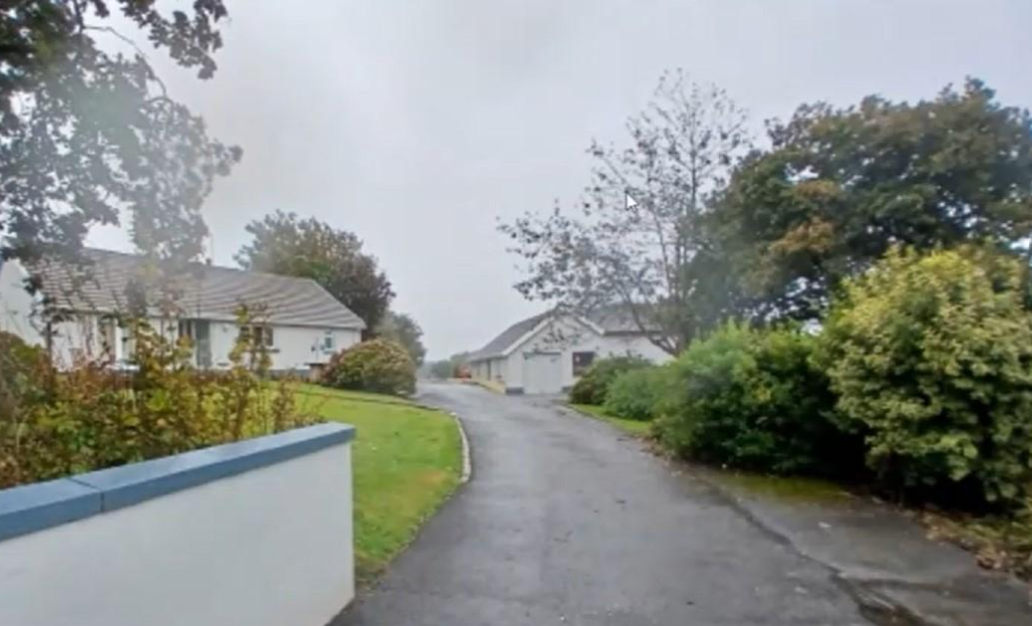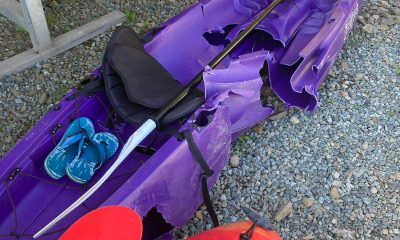Farming
NT claim ‘decades of damage’ to countryside


NFU Cymru President, Steven James: Countryside isn’t as damaged as National Trust insist
THE DIRECTOR GENERAL of the National Trust has called on government to put the recovery and future resilience of the natural environment at the heart of the funding system that will replace the Common Agricultural Policy (CAP).
Dame Helen Ghosh said reform was essential to reverse what she claimed were decades of damage to the countryside and the headlong decline of species.
Dame Helen told an audience at the National Trust Theatre at BBC Countryfile Live that the vote to leave the European Union presents an urgent opportunity to shape a new and better system for stewardship of the countryside.
She said:
“Whatever your view of Brexit, it gives us an opportunity to think again about how and why we use public money to create the countryside we want to hand on to future generations. Unless we make different choices, we will leave an environment that is less productive, less rich and less beautiful than that which we inherited.
“Taxpayers should only pay public subsidy to farmers in return for things that the market won’t pay for but are valued and needed by the public.
“We may need some kind of transition period to get there but that means payments for goods that go beyond food production – for the wildflowers, bees and butterflies that we love, for the farmland birds, now threatened, for the water meadows and meandering rivers that will help prevent the flooding of our towns, and for the rebuilding of the fertility and health of the soils on which both nature and production depend.
“In the long run, there’s no conflict between maintaining our ability to grow food and looking after the land and nature on which it depends. The first is utterly dependent on the second.
“This is not just about the subsidy system but the way the market works. Farmers should get a proper return from retailers and food manufacturers. If they are also producing clean water, unflooded streets or great holiday experiences, they should also get a proper return from the utilities or tourism industry.
“Farmers are key partners in finding solutions but this is too important to leave to governments and farmers to sort out between themselves.
“We would encourage ministers to now consult widely on the way we fund farming in a post-Brexit world and involve the public in the debate, along with organisations who have experience and insights to share.”
NFU Cymru President, Stephen James, said: “The picture the National Trust is trying to paint – that of a damaged countryside – is one that neither I nor most farmers, or visitors to the countryside, will recognise.
“Farmers manage 80% of Wales’ land area and through agri-environment schemes, such as Glastir, farmers continue to restore and establish new habitats for biodiversity. This includes over 310km of new streamside corridor; 265km of new or restored hedgerows and more and 20,000m2 of new ponds.
“Farmers take their responsibilities as custodians of the countryside seriously and most visitors to the countryside will be enjoying the natural environment and appreciating the views of rural Wales which have been created and maintained by farmers – including many of the landscapes showcased by the National Trust.
“In this debate we must not forget that food production is vital. We should not be contemplating doing anything which will undermine Welsh farming’s competitiveness or its ability to produce food. To do so would risk exporting food production out of Wales and for Wales to be a nation which relies even further on imports to feed itself.
“In our view, food security should be considered to be a legitimate political goal and public good. Welsh farmers are proud of the high standards of production, traceability of the food they produce and high animal welfare. Welsh food production is the bedrock of the food and drink sector – contributing £6.1 billion to the economy and employing 222,400 people.
“All our survey work shows that the Welsh public wants to buy more Welsh food and, interestingly, survey work also shows the Welsh public believes farmers play a beneficial role in improving the environment at the same time.”
Two of the largest beneficiaries of the current CAP regime are the National Trust, which receives £11m of subsidy each year, and the RSPB, with almost £7 million received in subsidy in 2015. Both organisations were vociferous campaigners against a reform of the CAP scheme in 2011, which would have seen them lose millions of pounds of subsidy and have their take from the scheme capped at £300K per year.
The extent to which the National Trust wants to see subsidy tied to the practices which would reap maximum benefit for itself from any subsidy system represents, potentially, special pleading by the organisation to ensure the best financial outcome for itself from any new subsidy scheme and puts down a marker as to what it would expect for itself out of such a scheme. The idea of a subsidy cut, such as that proposed by the EU in 2011, is evidently an unappealing one.
Moreover, Pillar 2 of CAP is for what’s vaguely known as ‘rural development’, which covers everything from preserving traditional farming practices and preventing the depopulation of the countryside to conservation and public access.
The Welsh Government has long taken an extraordinarily elastic view of the uses to which Pillar 2 funding can be put, and has used the payment scheme as a piggy bank to follow policies that are only connected tangentially to farming.
Farming
‘Poor decision’ New Creamston housing condition overturned

A “POOR DECISION” agricultural worker-only imposed nearly 40 years ago has been removed from a Pembrokeshire property by county planners.
In an application recommended to be approved at the December meeting of Pembrokeshire County council’s planning committee, Tim and Cathy Arthur sought permission for the removal of an agricultural worker-only condition at New Creamson, Creamston Road, near Haverfordwest.
An officer report for members said the agricultural condition was imposed when the dwelling was built in 1988/89, with a later certificate of lawful development granted this year after it was proven the site had been occupied for more than 10 years on breach of that condition.
An application for a certificate of lawfulness allows an applicant to stay at a development if they can provide proof of occupancy over a prolonged period.
Speaking at the meeting, agent Andrew Vaughan-Harries of Hayston Developments & Planning Ltd told members the original agriculture-only condition was a poor decision by planners back nearly four decades ago.
“When this application was made in 1988-89 we go back to the Preseli District Council – I was still in school – it was only a 50-acre farm, it should never have been approved as it shouldn’t have been viable.
“The current applicants have owned it for the last 20 years; they’ve tried to grow apples but couldn’t make a go of it and then went in to holiday lets. We can’t enforce redundant conditions from bad decisions made years ago.”
Approval was moved by Cllr Brian Hall and unanimously supported by committee members.
Business
Cwm Deri Vineyard Martletwy holiday lets plans deferred

CALLS to convert a former vineyard restaurant in rural Pembrokeshire which had been recommended for refusal has been given a breathing space by planners.
In an application recommended for refusal at the December meeting of Pembrokeshire County Council’s planning committee, Barry Cadogan sought permission for a farm diversification and expansion of an existing holiday operation through the conversion of the redundant former Cwm Deri vineyard production base and restaurant to three holiday lets at Oaklea, Martletwy.
It was recommended for refusal on the grounds of the open countryside location being contrary to planning policy and there was no evidence submitted that the application would not increase foul flows and that nutrient neutrality in the Pembrokeshire Marine SAC would be achieved within this catchment.
An officer report said that, while the scheme was suggested as a form of farm diversification, no detail had been provided in the form of a business case.
Speaking at the meeting, agent Andrew Vaughan-Harries of Hayston Developments & Planning Ltd, after the committee had enjoyed a seasonal break for mince pies, said of the recommendation for refusal: “I’m a bit grumpy over this one; the client has done everything right, he has talked with the authority and it’s not in retrospect but has had a negative report from your officers.”

He said the former Cwm Deri vineyard had been a very successful business, with a shop and a restaurant catering for ‘100 covers’ before it closed two three years ago when the original owner relocated to Carmarthenshire.
He said Mr Cadogan then bought the site, farming over 36 acres and running a small campsite of 20 spaces, but didn’t wish to run a café or a wine shop; arguing the “beautiful kitchen” and facilities would easily convert to holiday let use.
He said a “common sense approach” showed a septic tank that could cope with a restaurant of “100 covers” could cope with three holiday lets, describing the nitrates issue as “a red herring”.
He suggested a deferral for further information to be provided by the applicant, adding: “This is a big, missed opportunity if we just kick this out today, there’s a building sitting there not creating any jobs.”
On the ‘open countryside’ argument, he said that while many viewed Martletwy as “a little bit in the sticks” there was already permission for the campsite, and the restaurant, and the Bluestone holiday park and the Wild Lakes water park were roughly a mile or so away.
He said converting the former restaurant would “be an asset to bring it over to tourism,” adding: “We don’t all want to stay in Tenby or the Ty Hotel in Milford Haven.”
While Cllr Nick Neuman felt the nutrients issue could be overcome, Cllr Michael Williams warned the application was “clearly outside policy,” recommending it be refused.
A counter-proposal, by Cllr Tony Wilcox, called for a site visit before any decision was made, the application returning to a future committee; members voting seven to three in favour of that.
Farming
Farmers Union of Wales Warns: Labour’s 5G Expansion Risks Rural Blackspots

FUW Joins Landowners in Urgent Call to Pause Controversial Telecoms Reforms
THE FUW (Farmers’ Union of Wales) has warned that rural communities face worsening mobile blackspots and farmers risk losing essential income if the Labour Government expands a telecoms policy blamed for stalling Britain’s 5G rollout.
In a letter to Digital Economy Minister Liz Lloyd, the FUW aligns with landowners, investors, and property experts demanding a halt to Part 2 of the Product Security and Telecommunications Infrastructure (PSTI) Act 2022. Extending the 2017 Electronic Communications Code (ECC) would “entrench failure,” the group argues, sparking more stalled renewals, site losses, and legal battles just as Wales needs swifter rural connectivity.
The 2017 reforms empowered operators to cut mast rents—often by 90%—from hosts like farmers, councils, and NHS trusts. Far from boosting rollout, they’ve ignited over 1,000 tribunal cases since 2017, versus 33 in the prior three decades. Rural goodwill has eroded, with hosts now eyeing exits.
“Every lost mast isolates households, schools, and businesses,” the FUW states. “No public subsidy can fix this systemic damage.”
A survey of 559 hosts (via NFU, CLA, BPF) shows:
- 35% considering full withdrawal.
- 70% of expired lease holders facing operator legal threats.
Landowner Ted Hobbs in New Tredegar shares the pain: “My 1995 Vodafone lease was £3,500 yearly, renewed in 2010 at the same rate. It expired May 2025—now they demand a slash, backed by the Code. This is confiscation, not partnership.”
Labour’s push forward—despite earlier opposition and a critical consultation—ignores these red flags.
FUW President Ian Rickman adds: “Farmers hosted masts in good faith for rural connectivity. Punishing them with rent cuts sabotages Wales. Halt this now, restore trust, and incentivise real progress.”
The coalition urges ministers to reopen dialogue before deepening rural divides. Wales can’t afford more policy missteps.
-

 Crime2 days ago
Crime2 days agoDefendant denies using Sudocrem-covered finger to assault two-month-old baby
-

 Crime1 day ago
Crime1 day agoPembroke rape investigation dropped – one suspect now facing deportation
-

 Crime6 days ago
Crime6 days agoMan denies causing baby’s injuries as police interviews read to jury
-

 News1 day ago
News1 day agoBaby C trial: Mother breaks down in tears in the witness box
-

 Crime2 days ago
Crime2 days agoLifeboat crew member forced to stand down after being assaulted at Milford pub
-

 Crime3 days ago
Crime3 days agoDefendant denies causing injuries to two-month-old baby
-

 Crime3 days ago
Crime3 days agoPembrokeshire haven master admits endangering life after speedboat collision
-

 Crime15 hours ago
Crime15 hours agoMother admits “terrible idea” to let new partner change her baby’s nappies alone
















